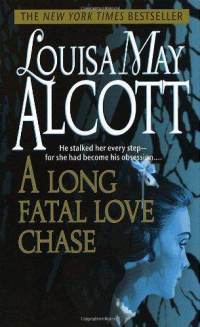A Long Fatal Love Chase by Louisa May Alcott
This book by Louisa May Alcott is the anti-Northanger Abbey. That is everything that could go wrong. But I’m getting ahead of myself, first some background.

This book was written in 1866. Alcott had just returned from her job as a companion to a wealthy women during her trip abroad and all throughout Europe. When Alcott came home she discovered that her father had run through almost all their money. Eager to do her part in helping out, she started writing stories and attempted to get them published.

Newspapers were the big story publishers, printing them week by week and often paying per word. Now this was before radio and TV, so these weekly publications of stories was their version of soap operas, every week ending on a cliffhanger.

Since the purpose was to get the reader hooked and constantly buying to find what happened next, they really wanted dramatic stories. Alcott did her best to oblige, only problem? She did a little too well.

Her book was not published as it was far too racy for the day. Think of it as the Fifty Shades of Grey of the 19th century. Yep this novel deals with sex, violence, obsession, abuse, hypocrisy in religion, greed, the question of insanity, mistreatment of women, women’s rights, divorce, bigamy, suicide, murder, etc.

What?
While today’s audiences would go for all that, those back in 1866 dropped it like a hot potato. Alcott shelved the book, it not being published until 1995.

Wow
How Does It Relate to Northanger Abbey?

Hmm…
Well, first you have to understand how Northanger Abbey came about.

In 1605, Don Quixote, by Miguel Cervantes, was published. This book told the story of Don Quixote, a Spanish nobleman, who reads so many chivalric and romantic stories (not romance stories as we have today, but the “classical romances”) that he sort of loses his sanity trying to live those values and live in that world, in the modern 17th century. He gets into all kind of crazy antics, battling other “knights”, “monsters”, etc.
In 1752, Charlotte Lennox parodied Don Quixote with her novel, The Adventures of Arabella also known as The Female Quixote. Her story is about a young girl, Arabella, who has been sequestered away in the middle of nowhere with just her father for companionship. Not encountering many people and her mother dying + father ignoring her; she learned all about people and how to interact with them from “classical romances”. This book goes over the problems of having read so many “romance novels”, you expect life to follow, only to be sorely disappointed.

Now Jane Austen’s Northanger Abbey, published in 1818, was meant to be a parody of The Female Quixote, gothic fiction, societal rules of the day, etc. One of the reasons why a lot of people don’t “get” this novel is that they don’t understand what she is poking fun at or trying to say about these subjects.

Hmm…
In Austen’s story, we have a young girl, Catherine, who has been raised not as sequestered as Arabella, but definitely in the country resulting in some naivety. She loves romance novels and gothic fiction, giving her an overactive imagination.

She is asked to accompany family friends to Bath for a season and while there finds herself encountering some of the problems of the other before mentioned characters. Her education in romance novels didn’t prepare her for how people act. Her overactive imagination does get the best of her as well. The other thing about this book is that Catherine does go through some events that are right out of a romance novel or gothic tale.

She meets two handsome strangers, both trying to win her; encounters some dangerous and immoral men; gets caught up in a plot to get money; and has the man of her dreams come after her to tell her he loves her.

So awesome!
And then we have A Long Fatal Love Chase, written in 1866, and follows the same veins as these other books, except taking a much darker twist.

Now I don’t know if Alcott has read any of these authors and set out to copy part of their ideas or what; but the stories are so similar I can’t help but believe that at least one of these authors inspired her.

![]()
The Plot:
A Long Fatal Love Chase, begins with our heroine Rosamund or Rose. She has lived on a small island with her grandfather ever since her parents died when she was very young. She has encountered no other people, from the time of her parent’s death, and therefore has a lot of naivete and a lack of propriety as she doesn’t know better.

Just living in my own world
Life with her grandfather is dreary, as he provides for the physical things (shelter, clothes, food, etc) but ignores Rose and doesn’t care for her emotional being.

This makes her wish that she could have someone take her away from it all, just like in the romance novels. In fact she states
“I would give my soul to the devil, for a year of freedom.”

Enter Philip Tempest.

Tall, brooding, handsome, rich, has a swashbuckling scar, sails around the world on his yacht, etc.

He comes to visit Rosamund’s grandfather and is quite taken with Rose’s sweet disposition, naivete, and young, innocent character. Rose falls in love with him, and dreams of the possibility that he might take her away from everything.

Tempest wants Rose and is not a man used to hearing NO. He plays cards with the grandfather, winning Rose.

I’m taking her.
He carries her away in his boat telling her that he is the master and she must serve him. He wants her only as his mistress, but Rose refuses anything until they are married. Tempest reluctantly agrees.

Women
A year later the couple are living in France to attend the gaieties. Besides Rose and Tempest, their party includes Baptiste, Tempest’s right hand man who does everything he says, and Impolito “Lito”, a Greek cabin boy who looks very familiar (aka Tempest’s child, very obvious). All has been great for the couple until Tempest runs into an old friend Willoughby. Willoughby???!!!

He knows something that Tempest is determined to keep hidden, so Tempest kills him.

Gasp!
Unbeknownst to him, a girl from a flower shop delivers a note to Lito, who then runs off to a secret meeting. Rose sees this and comments on it to Tempest. Tempest becomes so furious that Lito would “correspond” with her, that he sends him away.

Hmm…
Later Rose overhears Baptiste telling Tempest that “no one will find him in the grove.” When she goes to investigate she discovers a mound of dirt as in a new grave, and the pin she gave Lito.

She starts to think that Tempest might have killed Lito. She still has her doubts, of which all are dashed when she overhears another conversation. This time she overhears a conversation between Tempest and a woman, a woman who is HIS WIFE.

Yes Lito is their son, of which Tempest took when he left his wife. He has wanted a divorce but she won’t grant him one unless he gives her custody of their son, something Tempest would never do. He has been sailing around the world with many mistresses, content if not fully happy. He met Rose and faked the marriage in order to make her happy, knowing that it was void. Rose becomes distraught at his lies and betrayal of trust and runs away.

Noooo!
So here’s where it gets even more dramatic. We see a man from a romance character ready to make your dreams come true, right? Wrong! Tempest is an abuser and a controller. He tells Rose that her loves her, but in truth having her being subservient gives him power. Where ever she runs, he chases her, intent on making her his. We have the anti-Northanger Abbey as instead of a dreamy, true life romance hero; we have a sociopath.

Now some may wonder why is Tempest evil, but Mr. Rochester from Jane Eyre who does a similar thing romantic? Well for two reasons. The first is that Mr. Rochester was tricked into marrying his wife by his family, who wanted a merger with their business and her family, who no longer wanted to take care of her. They hid the illness well, and when Mr. Rochester discovered how crazy she was it was too late, and those who are insane can’t get divorced. He’s stuck with her.

He has to live with a woman who is more animalistic than human and constantly trying to murder him.

Tempest married a beautiful, wealthy, Greek-English girl; become bored and left. He hates being tied down and loves being in power. He stole their child from his wife and covered it up by having her told Lito was dead. She was heartbroken as she believed him, only discovering the lie when Willoughby writes to her.

Mr. Rochester does try to marry Jane as he falls in love with her, but is stopped from committing bigamy by his wife’s brother. Jane leaves, and as much as he doesn’t want her to go, he respects her wishes and leaves her alone.

Aw!
Tempest marries Rose, having a friend pretend to be a preacher and perform the wedding service. Rose finds out and leaves, Tempest refuses to acknowledge her feelings and actions and stalks her.

What a psycho!
Rose starts work with a seamstress in a French village, but Tempest finds her barricaded in her room. He tells her that he will be getting the divorce soon, and then they can be together forever. That night Rose escapes, with help from a friend, and finds refuge with an actress. She spends some happy time there, and even reunites with Lito, who was not killed but sent somewhere. All is not perfect as Tempest finds them again, and the two flee.

I’m out!
Rose to a convent and Lito to his mother. Later Rose discovers a dead body, and she plants evidence so that people would think it was her.

Hmm…
Rose enjoys being in the convent and serving, paying penance for her sins. She befriends the two priests; Father Dominic the elder, and Father Ignatius, young and deeply in love with Rose. Rose seeks help from Father Dominic to overcome her love and temptation to return to Tempest, only to discover that both the Mother Superior and Father Dominic sold her out to Tempest.

She escapes Tempest again, and reunites with the Comté who’s daughter she saved from dying of fever. He takes care of her and falls in love, asking her to marry him. She agrees and gets ready to, when Tempest finds her once again. He convinces the Comté that Rose is his wife and insane.

You’re crazy!
Crazy, am I? We’ll see whether I’m crazy or not.
As the Comté deserts her, and Tempest is preparing to carry her off, Rose commits suicide, shooting herself.

Unfortunately the shot to her side wasn’t deadly, but does have her thrown into a mental institution (from yours truly Tempest). There she lives some horrible and demoralizing days. She manages to convince Baptiste to turn to her side and help her escape the asylum, only to discover it is another ploy by Tempest to capture her.

AAAAAAHHH!!!!!!!!!!!!!
Tempest carries her away to a remote island, intent on being kind and sweet, wooing her. He is divorced now and wants Rose for his wife and forever. She ends up being saved by Father Ignatious, fleeing to the safety of Tempest’s ex-wife, but finds out that getting out of the Tempest is not easy.

Will it ever be over?
![]()
Was the Book Good?
I thought this book was very interesting. And had some pros and cons.
Pros:
First I recommend this book for all Alcott fans as it is so strikingly different from her other works. All the other novels: Little Women, Little Men, Jo’s Boys, The Inheritance, etc.; were dramatic and fun stories; but nowhere near as sensational and traumatic as this book. If it hadn’t said Louisa May Alcott on the cover, I never would have guessed it was something she has written. You won’t understand until you read it and get a shock.

I’m in shock
What also is fascinating is how Alcott brings to light how much power men have over women at this time, and the inequality in relationships. You have to remember this was not done at the time. Women were men’s property and they could not only do as they wished, but held all the power. I don’t know how many of you saw The Duchess, starring Keira Knightly, but look how unfair women are treated. Georgina is a Duke’s wife but is forced to share her home with the Duke’s mistress and the mistress’ children. When she steps out on him, she loses everything; position in society, her children, etc. He gets to do whatever he wants, hit her, embarrass her, rape her; but she has to follow society’s rules.

So not fair!!
This is what happens in this book. Tempest is abusive, a stalker, and a psychopath; but gets to continue in his behavior because he is male. When Father Ignatious helped Rose escape the convent and reach the Comté, he writes the Comté a letter with all that happened and warning him against Tempest. Yet when Tempest comes, the Comté easily believes the woman is crazy, rather than this charismatic man is what Rose and the Priest say he is.

Alcott also brings to light abusive relationships, stalking, what it feels like, etc. This book is sort of the 19th century’s version of Sleeping With the Enemy. Here Alcott is clearly showing that this behavior is wrong and should not be accepted.

Cons:
It was too dramatic for my taste. I’m not really a soap opera/telanovela type person. The end in which she is in love with the priest and the priest loves her but both resolve to do nothing about it was not only too flowery, but boring.

![]()
For more on Northanger Abbey, go to Read Jane Austen, Wear Jane Austen
For more Northanger Abbey variations, go to Midnight in Austenland
For more books based on Jane Austen, go to Prude & Prejudice

